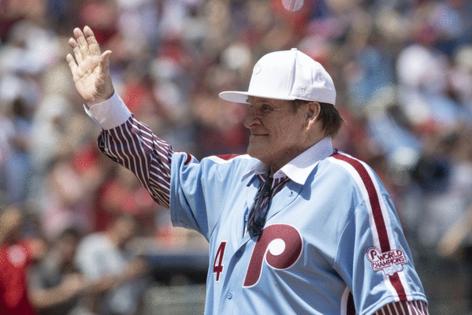Pete Rose is now eligible for the Hall of Fame. But that doesn't mean he'll get the votes for induction.
Published in Baseball
Let’s be clear: It was quite a thing Tuesday that Pete Rose’s name — 16 others’, too, including “Shoeless” Joe Jackson’s — was posthumously removed from Major League Baseball’s permanently ineligible list.
But it was only one thing.
Because although commissioner Rob Manfred’s landmark decision that a lifetime ban lasts only for a lifetime enables Rose and the others to finally be considered for the Hall of Fame, it hardly makes any of them a shoo-in.
Not even the Hit King.
In a letter to the Rose family’s attorney Jeffrey M. Lenkov, Manfred wrote, in part: “[A] person no longer with us cannot represent a threat to the integrity of the game. Moreover, it is hard to conceive of a penalty that has more deterrent effect than one that lasts a lifetime with no reprieve.”
Put another way, this wasn’t a pardon, even though it was initiated earlier this year by President Donald Trump. It certainly wasn’t an exoneration of Rose, who was found to have bet on games while managing the Cincinnati Reds 35 years ago.
Manfred’s objection to reinstating Rose while he was alive was that his presence around ballparks and potential influence on people within baseball might “pose a risk to the integrity of the sport,” in the commissioner‘s words.
But the punishment outlasted the perpetrator. Rose died from a heart condition last Sept. 30 at age 83.
In a statement, the Phillies said they “support” Manfred’s decision to reinstate “one of the greatest players in the history of the game” (also, their World Series-winning first baseman in 1980). Mike Schmidt called it “a great day for baseball.”
Swell. Manfred’s carefully worded ruling came down at 4 p.m. The more consequential statement went out five minutes later from Jane Forbes Clark, chairman of the board at the Hall of Fame, and confirmed only that individuals who are removed from MLB’s ineligible list can finally be considered for election by a historical committee.
Here’s what the statement didn’t include: Rose’s name.
Unlike players when they first become eligible for the Hall of Fame, Rose’s candidacy won’t be adjudicated on the writers’ ballot. According to the Hall’s voting rules, players who are retired for more than 15 years are considered not by 400-plus writers but rather a smaller “era committee,” comprised of Hall of Famers, executives and media, who aren’t identified until a few days before they meet. Many of the players, in particular, tend to be ultra-protective of the doors to Cooperstown.
Rose could appear on the ballot for the Classic Baseball Era Committee, which isn’t scheduled to meet until December 2027, according to the Hall of Fame. And based on the voting of previous era committees, he figures to have a difficult time getting elected.
Consider this: Barry Bonds and Roger Clemens, whose Hall of Fame candidacies were muddied by their associations with performance-enhancing drug use, received 66% and 65.2% of the vote, respectively, in their final year on the writers’ ballot. (75% is required for election.)
In 2022, Bonds and Clemens came up before a 16-member Contemporary Baseball Era Committee. Neither got even four votes out of the requisite 12.
If that committee wasn’t willing to overlook sins made by the all-time home run leader or a seven-time Cy Young Award winner, why would another one forgive Rose’s many transgressions, which include not only betting on baseball but also a 2017 allegation of a sexual relationship with an underage girl when he was in his 30s?
In his statement Tuesday, Schmidt referred to Rose’s Hall of Fame case as an “ongoing question” and congratulated Rose’s family on the “opportunity for consideration.”
Make no mistake: That’s all it is — an opportunity.
Schmidt has previously backed Rose for the Hall of Fame based on his playing credentials, chiefly the most hits (4,256) in the history of the sport. But in 2017, Schmidt said it was “ridiculous” to even consider Rose for the Hall.
“[W]e all know about his personal life, of being banned from the game, and living a lie for a lot of years and fessing up to it, and the questions about how contrite he was after that,” Schmidt said then. “ … I’m just giving a realistic opinion because of the commissioner‘s position on it, the current Hall of Famers’ position on it, guys-with-votes’ position on it.”
Manfred closed his letter to Lenkov with this: “I want to emphasize that it is not part of my authority or responsibility to express any view concerning Mr. Rose’s consideration by or possible election to the Hall of Fame.” The commissioner‘s position — this commissioner‘s, at least — changed only in that Manfred didn’t see the sense in upholding a life sentence for the deceased.
But who’s to say that Hall of Famers, some of whom will be “guys with votes” on the committee that may judge Rose, will have the same view when the immortality that comes with a plaque in Cooperstown is at stake?
©2025 The Philadelphia Inquirer. Visit inquirer.com. Distributed by Tribune Content Agency, LLC.







Comments